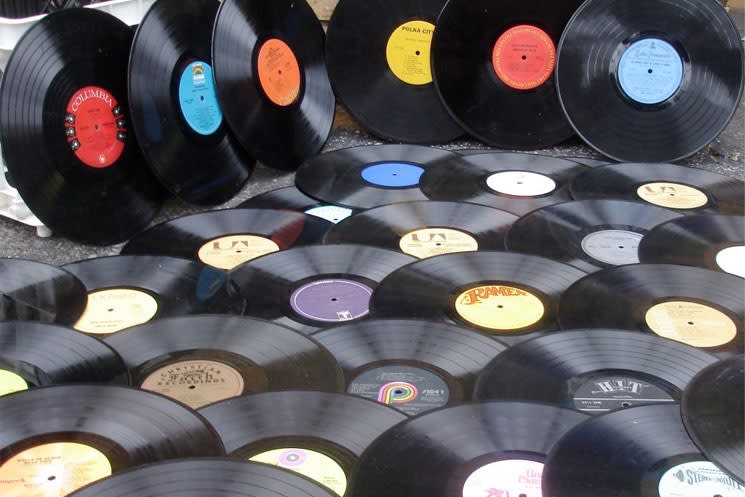Vinyl sales hit a new high in December of 2021 — and, as luck and the Fibonacci sequence would have it, the record-breaking cost of records followed swiftly with the release of Tool's ultra-deluxe Fear Inoculum. Amid the vinyl boom and its consequent worldwide shortage, one Dutch company believes a new pressing technology could both remedy the backlog and also be more sustainable by foregoing the use of the material that gave vinyl its name.
While streaming music is even worse for the environment (as is our general existence, etc.), it's a little easier to connect the dots on vinyl's damage when you can envision the physical entity of a record piling up in a landfill. As the BBC reports, the polyvinyl chloride (PVC) involved in vinyl pressing has recently been identified as "the most environmentally damaging of plastics."
Green Vinyl Records is breaking ground on pressing machines that forego it for polyethylene terephthalate (Pet) — a less-harmful material that is equally durable and easily recyclable. The novel pressing technology also uses just 10 percent of the energy required by standard vinyl pressing as we currently know it.
Likewise, it caters to the increased demand with a capacity to produce nearly 40 percent more records than traditional pressing plants. "The pressing here is both faster and better for our planet," owner Harm Theunisse told the BBC.
Okay, but how does it sound? The main reason why PVC has remained a fixture of the industry in spite of its dangers to the environment is its ability to reproduce recordings at such high quality.
"The barrier to finding eco-friendly alternatives to PVC has always been the desire to match the same rich sound quality while maintaining the hardness and durability of plastic," said Sharon George, senior lecturer in sustainability at Keele University. George thinks Green Vinyl Records' methodology is "a real step in the right direction."
An early collaborator on Theunisse's project, Record Industry plant owner Ton Vermeulen says he's had people asking if records could be pressed from plastic extracted from the ocean, and that audiophile-approved sound quality is what's keeping that level of sustainability "impossible."
Of Green Vinyl Records' technology, he added: "I think it's the unknown aspects, and the costs involved to put high investment in — because these machines are massively more expensive than the presses we use over here. I'm not saying there is no space for such a new technique, but I have doubts if [record] companies are going for it."
But Theunisse just signed his first order from Warner Music Group, one of the three major labels Jack White has called upon to create their own pressing plants. And though the entrepreneur acknowledges the initial costs of the innovation, he estimates a return on his investment within 18 months. He wants future generations to be able to enjoy music on vinyl without the compromise of damaging the planet.
"It's for the kids," Theunisse said. "Our world is heating up."
While streaming music is even worse for the environment (as is our general existence, etc.), it's a little easier to connect the dots on vinyl's damage when you can envision the physical entity of a record piling up in a landfill. As the BBC reports, the polyvinyl chloride (PVC) involved in vinyl pressing has recently been identified as "the most environmentally damaging of plastics."
Green Vinyl Records is breaking ground on pressing machines that forego it for polyethylene terephthalate (Pet) — a less-harmful material that is equally durable and easily recyclable. The novel pressing technology also uses just 10 percent of the energy required by standard vinyl pressing as we currently know it.
Likewise, it caters to the increased demand with a capacity to produce nearly 40 percent more records than traditional pressing plants. "The pressing here is both faster and better for our planet," owner Harm Theunisse told the BBC.
Okay, but how does it sound? The main reason why PVC has remained a fixture of the industry in spite of its dangers to the environment is its ability to reproduce recordings at such high quality.
"The barrier to finding eco-friendly alternatives to PVC has always been the desire to match the same rich sound quality while maintaining the hardness and durability of plastic," said Sharon George, senior lecturer in sustainability at Keele University. George thinks Green Vinyl Records' methodology is "a real step in the right direction."
An early collaborator on Theunisse's project, Record Industry plant owner Ton Vermeulen says he's had people asking if records could be pressed from plastic extracted from the ocean, and that audiophile-approved sound quality is what's keeping that level of sustainability "impossible."
Of Green Vinyl Records' technology, he added: "I think it's the unknown aspects, and the costs involved to put high investment in — because these machines are massively more expensive than the presses we use over here. I'm not saying there is no space for such a new technique, but I have doubts if [record] companies are going for it."
But Theunisse just signed his first order from Warner Music Group, one of the three major labels Jack White has called upon to create their own pressing plants. And though the entrepreneur acknowledges the initial costs of the innovation, he estimates a return on his investment within 18 months. He wants future generations to be able to enjoy music on vinyl without the compromise of damaging the planet.
"It's for the kids," Theunisse said. "Our world is heating up."
